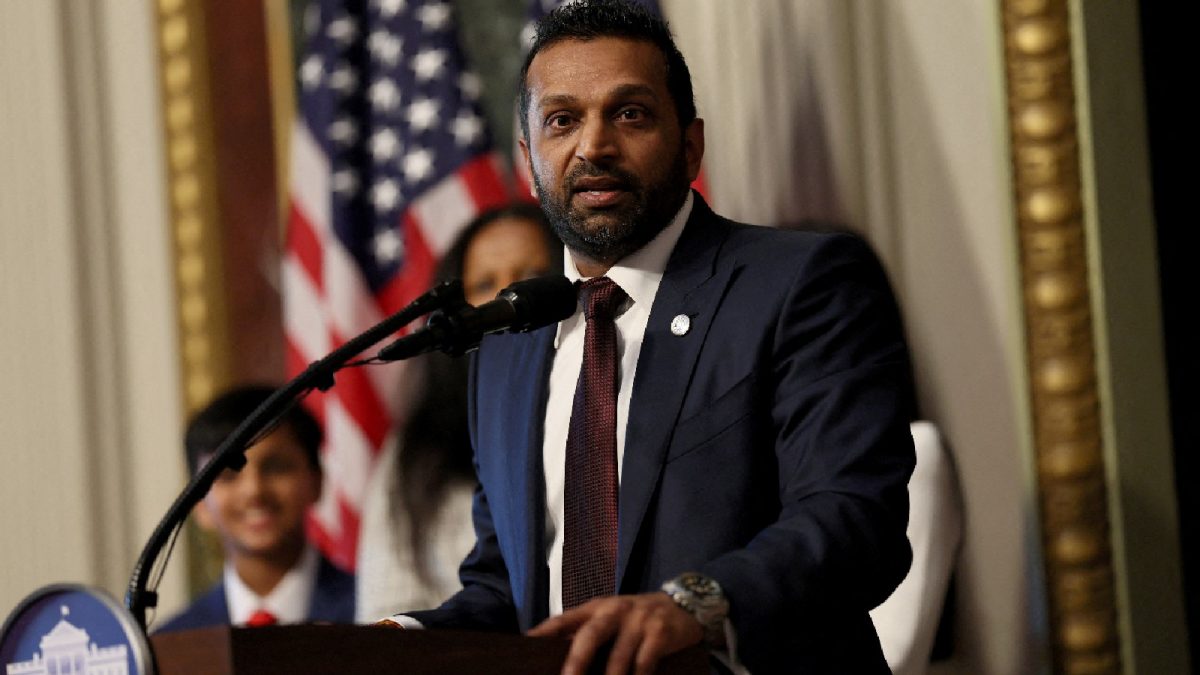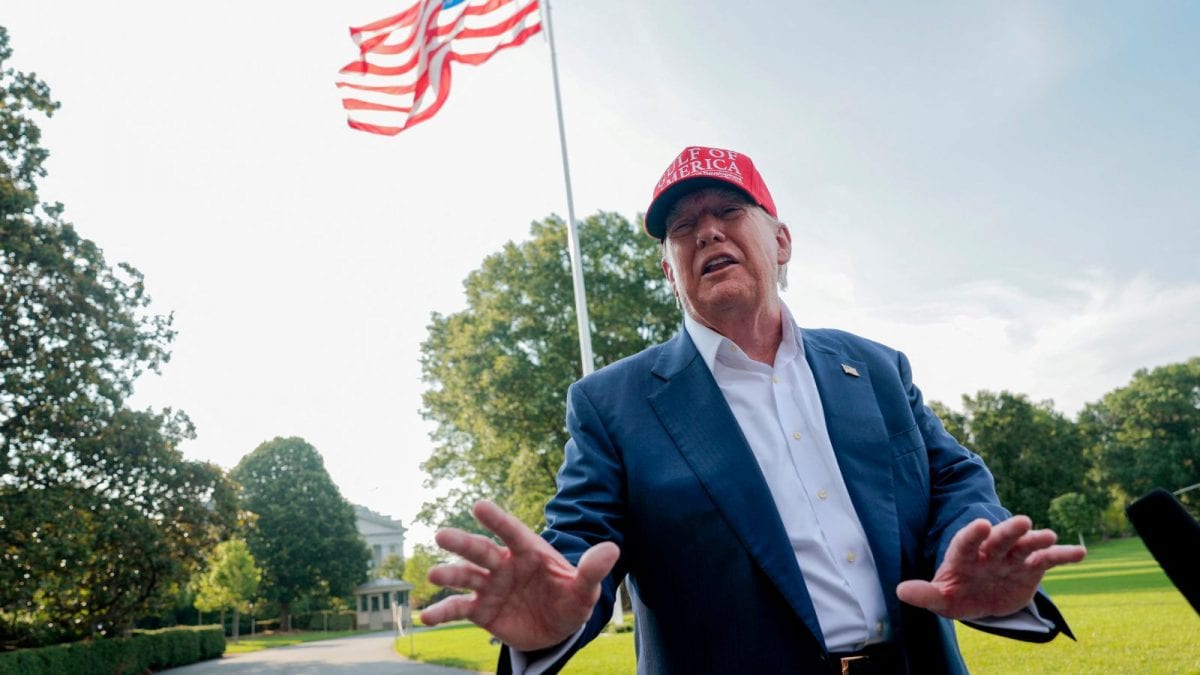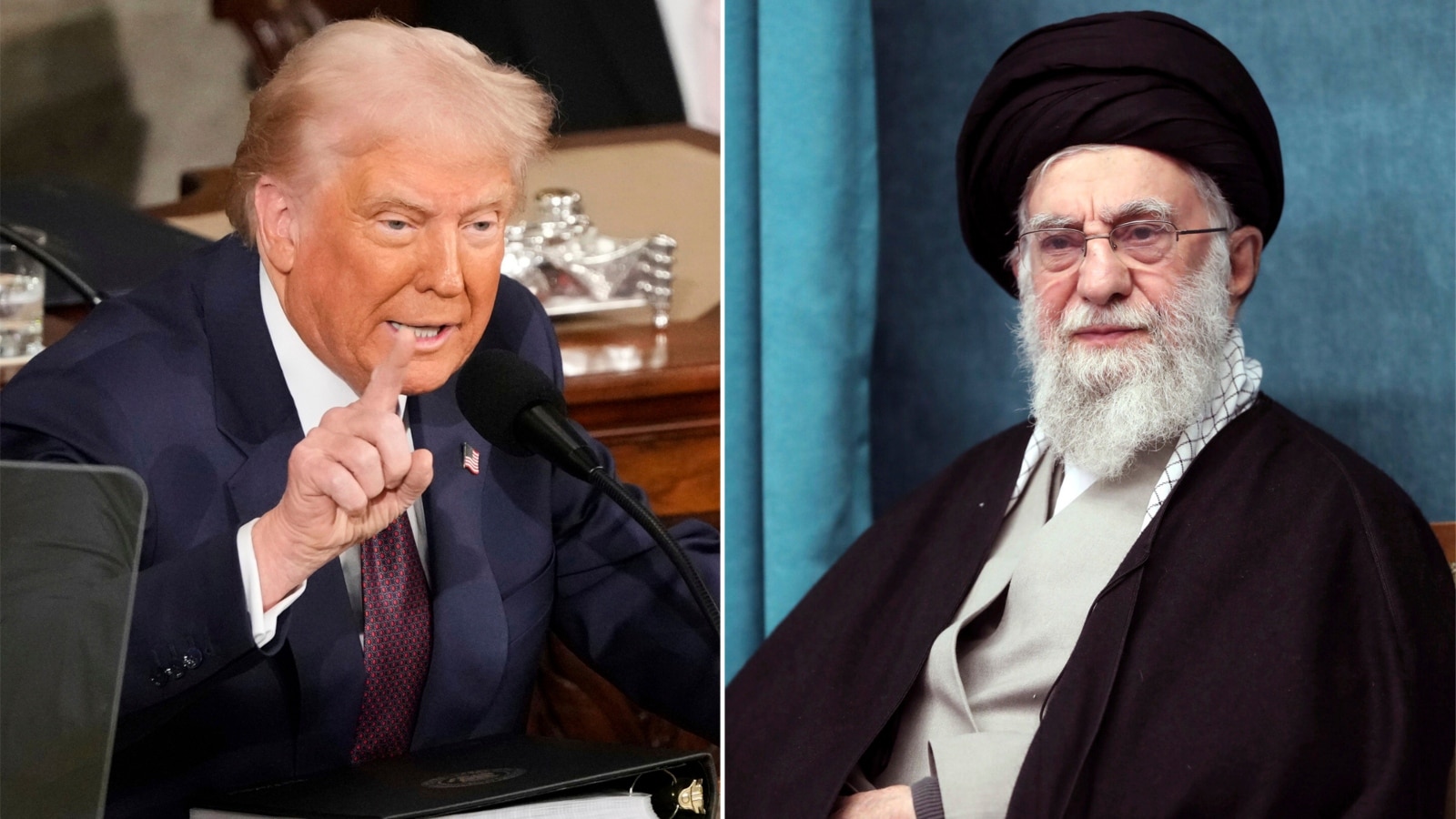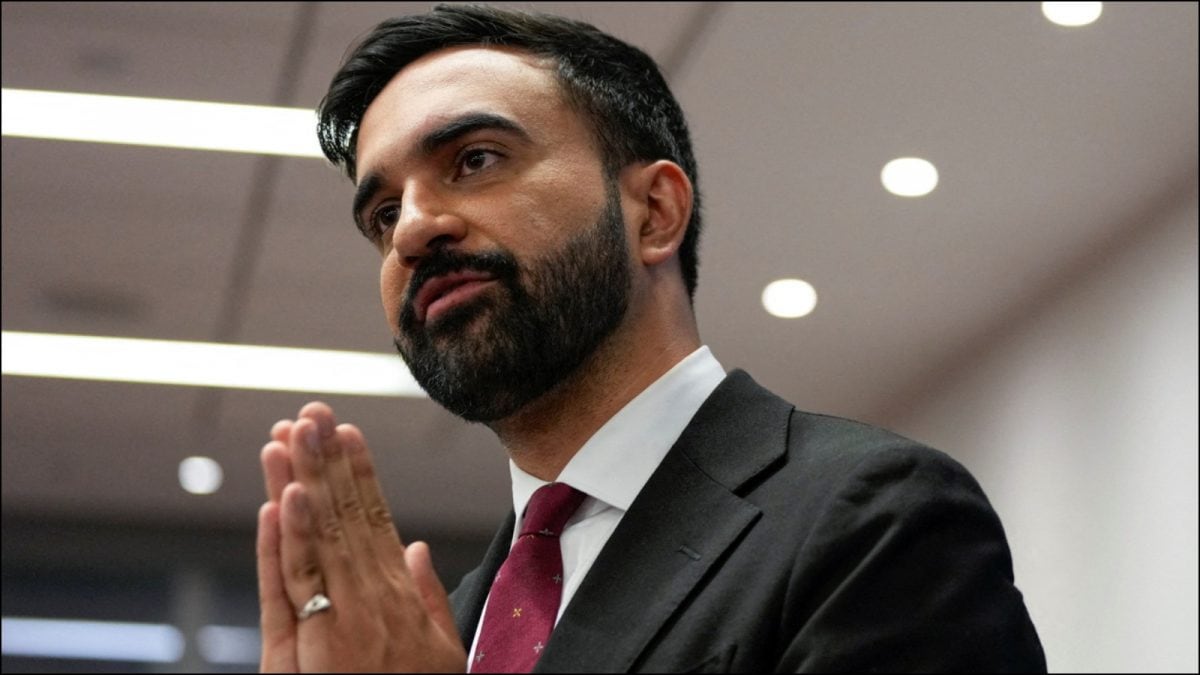Starmer says he wants to move on 'from stale old debates' of Brexit with EU deal
Keir Starmer has said that today’s deal with the EU is about moving on from “stale old debates” of the past. He said:
It’s time to look forward. To move on from the stale old debates and political fights to find common sense, practical solutions which get the best for the British people.
We’re ready to work with partners if it means we can improve people’s lives here at home.
So that’s what this deal is all about – facing out into the world once again, in the great tradition of this nation. Building the relationships we choose, with the partners we choose, and closing deals in the national interest. Because that is what independent, sovereign nations do.
Starmer is clearly referring to the way the discussion about relations with the EU continues to be framed by supporters of Brexit as a matter of either taking back control or surrendering. (See 11.15am.)
In other contexts, such as in his speech last week on immigration, Starmer is happy to talk about “taking back control”. But, on trade, he does not view negotiations in binary terms. In an interview in the Times published on Saturday, Starmer repeatedly said that he was not interested in “relitigating the arguments of the past”.
Key events Show key events only Please turn on JavaScript to use this feature
Meat industry welcomes deal, saying Labour has achieved 'what previous government promised originally but didn't deliver'
The British Meat Processors Association has issued a statement strongly welcoming the deal with the EU. It says that, making access to the EU market easier for meat exporters, Keir Starmer has “managed to achieve what the previous government promised us originally but didn’t deliver”.
The association has also dismissed claims that the deal will mean the UK being a “rule taker” because it will aligned with the EU on sanitary and phytosanitary (SPS) rules. It says:
A common misunderstanding is that an SPS agreement will mean Britain becomes a ‘rule taker’. In reality, we must comply with the rules of any of our trading partners if we want to export to them – just like America must comply with British rules if they want to send us their products. This means we have been aligned with EU rules and standards all along. The difference this new deal will make is that Britain, unlike their other third country trading partners, will benefit from true, un-fettered access to their market and massively reduced trade friction. It will boost trade and make us more competitive.
Under the existing arrangement we have had to produce a mountain of paperwork to prove we comply, costing business a fortune but with no added value. This extra cost had to be absorbed somewhere in the supply chain, either through lower margins or higher prices, driving food price inflation and rendering UK businesses less competitive.
Starmer says he wants to move on 'from stale old debates' of Brexit with EU deal
Keir Starmer has said that today’s deal with the EU is about moving on from “stale old debates” of the past. He said:
It’s time to look forward. To move on from the stale old debates and political fights to find common sense, practical solutions which get the best for the British people.
We’re ready to work with partners if it means we can improve people’s lives here at home.
So that’s what this deal is all about – facing out into the world once again, in the great tradition of this nation. Building the relationships we choose, with the partners we choose, and closing deals in the national interest. Because that is what independent, sovereign nations do.
Starmer is clearly referring to the way the discussion about relations with the EU continues to be framed by supporters of Brexit as a matter of either taking back control or surrendering. (See 11.15am.)
In other contexts, such as in his speech last week on immigration, Starmer is happy to talk about “taking back control”. But, on trade, he does not view negotiations in binary terms. In an interview in the Times published on Saturday, Starmer repeatedly said that he was not interested in “relitigating the arguments of the past”.
Deal with EU will make food cheaper and add £9bn to UK economy, says No 10
Downing Street has published its summary of the deal with the UK, and it claims that it will add almost £9bn to the value of the economy by 2040.
And here is Jessica Elgot’s story.
Severin Carrell is the Guardian’s Scotland editor.
A leading marine conservation group has said the row over the length of the EU fisheries deal is artificial and misses key facts about the British fishing industry, since many British trawlers are EU owned and increasingly controlled by very large firms.
Phil Taylor, director of Open Seas, a conservation charity, said:
The debate about the length of the fishing deal and the amount of access granted to EU boats is missing a key point, since some of the biggest UK fishing companies are EU owned, while a number of Scottish boats are still landing more than half their catch directly to the continent.
Despite UK law requiring fishing quota be distributed in ways that incentivise low impact fishing, the rights to most UK fishing quotas are handed freely to businesses. And those rights can be bought and sold, allowing access to this public resource to be consolidated by those with the deepest pockets with very few conditions, such as sustainability measures, put on its use.
Hall said the Scottish government’s complaints it had been ignored by UK ministers (see 8.51am), despite having policy responsibility for fisheries in Scottish waters, were also ironic. The Scottish government was now more than two years late delivering 22 fisheries management plans required after Brexit, he said. He went on:
It’s time that our national fisheries authorities invest the same level of energy in establishing a fairer system to distribute quota and sustainable management of the seas as they invest in the negotiations with the EU over rights of access in the first place.

Gwyn Topham
Gwyn Topham is the Guardian’s transport correspondent.
The Ryanair boss Michael O’Leary, who has been a strong critic of Brexit, has said that it would be good for the UK to have a youth mobility scheme with the EU. (See 11.59am.) He said:
It would make a big difference, generally to hospitality, retail, agriculture over here, and particularly in the regions where a lot of the hotels are struggling for staff, if those sectors could bring in lots of Portuguese, Italian, Spanish kids to come over here, even on summer jobs, it would be very helpful for the UK economy. Get them over here. They’ll come here and work and pay tax. So what? What’s the issue?
Youth mobility scheme with EU to be called 'youth experience scheme', leak suggests
The UK government was very nervous about about agreeing a youth mobility scheme with the EU because it was nervous about the proposal being associated with free movement, even though youth mobility schemes are very different. For a long time ministers claimed they were not planning to agree a scheme of this kind.
Now it has been confirmed that they are discussing on. But the details have not been agreed and, according to the Telegraph’s leak of text of the deal (see 11.30am), they are going to call it a “youth experience” scheme instead. According to the Telegraph, the text says:
The European Commission and the United Kingdom should work towards a balanced youth experience scheme on terms to be mutually agreed. The scheme should facilitate the participation of young people from the European Union and the United Kingdom in various activities, such as work, studies, au-pairing, volunteering, or simply travelling, for a limited period of time. It should provide a dedicated visa path and ensure that the overall number of participants is acceptable to both sides.
Starmer's deal 'far worse than Boris Johnson's' for fishing sector, says Scottish Fishermen's Federation

Severin Carrell
Severin Carrell is the Guardian’s Scotland editor.
The leader of the UK’s largest fishing industry body has lambasted the EU fisheries deal, claiming it was worse for the sector than the original Brexit treaty.
Elspeth Macdonald, chief executive of the Scottish Fishermen’s Federation, said:
This deal is a horror show for Scottish fishermen, far worse than Boris Johnson’s botched Brexit agreement.
[Any] attempt by either the UK or EU to portray the new deal as a continuation of existing arrangements would be a lie, because in fact the trade and cooperation agreement paved the way for annual access negotiations from 2026.
At the weekend, Sir Keir said the deal would be measured against how much it would improve job prospects and allow our communities to flourish.
Giving away a national asset such as our rich and healthy fishing grounds for no discernible benefit not only fails both of these tests, but is a disgrace that will ensure the enmity of this proud industry for many years to come.
Scottish fleets land a significant majority of the UK’s catch, based in ports such as Peterhead and Lerwick, with 61% of the UK’s overall capacity. Many UK boats also land significant quantities in Norway.
The latest UK government landings data for 2023 found that UK vessels landed 719m tonnes of fish worth £1.1bn but the UK remains a net importer of fish, chiefly from China, Norway and Iceland.
Joe Barnes at the Telegraph has published what he says is the full text of the EU-UK deal being announced today. It does not seem to have impressed the paper’s bosses (the deal itself, that is – not Barnes’ scoop.) The Telegraph website is currently dominated by an enormous headline saying: “Starmer caves in.”
(The Telegraph is strongly pro-Brexit. See 11.15am.)
There are strong 2019 echoes in what the Conservatives, Reform UK and all other Brexiters are saying about the deal today. This was evident in Andrew Bowie’s interview on the Today programme this morning (see 9.12am), and also on the front pages of the pro-Brexit papers.
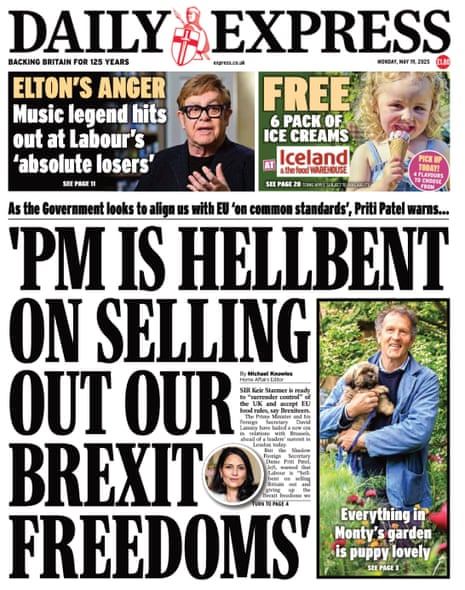
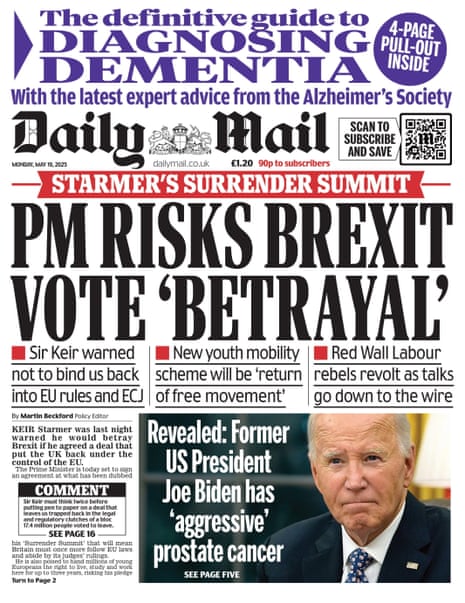
But it is worth point out that public opinion on Brexit has shifted considerably since 2019, which means this messaging is likely to be a lot less effective than it was when Boris Johnson was using it. According to YouGov polling published in January, Britons now believe that leaving the EU was a mistake by almost two to one.
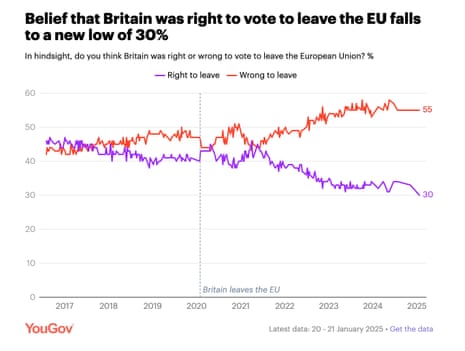
Steve Bray, the anti-Brexit campaigner who still stages a regular, and noisy, protest outside the Houses of Parliament, has decamped to Lancaster House this morning. But he is not protesting today. He has been playing the Ode to Joy, and has told police that what he is staging is “more of a celebration”.
The Scottish Conservatives have issued a statement denouncing the fishing agreement. This is from Tim Eagle, fishing spokesperson for the Tories in the Scottish parliament.
This agreement is an absolute disaster for the Scottish fishing industry. Sir Keir Starmer and the UK Labour government have not just surrendered to the European Union’s demands, they have totally capitulated to them.
The deal is a shameful betrayal of our fishermen and will go down like a lead balloon in our coastal communities across Scotland. It is even worse than they feared.

Jennifer Rankin
Jennifer Rankin is the Guardian’s Brussels correspondent.
EU officials have hailed the agreements with the UK as starting “a new chapter in relations”.
The bloc’s most senior diplomats from all 27 member states met early on Monday to approve the three texts that are due to be signed later by Keir Starmer, European Commission President Ursula von der Leyen and European Council president António Costa.
The three documents are: 1) a security and defence agreement; 2) a joint statement setting out common views on global challenges, such as the war in Ukraine; and 3) a common understanding paper – the key text pointing the way to further agreements including a youth mobility deal and veterinary agreement.
An EU official said:
We have entered a new chapter in our relations with [the] UK – a neighbour, an ally and a global partner.
The negotiation process in the run-up to this summit went until the last minute. But negotiations took place always in good faith on both sides, and the result is very positive for both.
Simon Clarke, levelling up secretary when Liz Truss was PM, former MP for Middlesbrough South and East Cleveland and a leader Tory Brexiter, has described today’s deal as “a triumph of elite concerns”. He posted this on social media.
Today is a triumph of elite concerns - youth mobility, 5 minutes quicker through the airport in Tuscany in summer - over those of working class Britain.
It’s not these people, or their kids, who will miss out on jobs or have their wages undercut by EU labour. They don’t care about scarce fishing grounds being hoovered up by French or Spanish super trawlers. They don’t worry about whether British agriculture is stopped from innovating. And so it goes on.
We spent 4 years battling to leave the EU properly, to avoid the utter humiliation of leaving only in part, and becoming a ruletaker. That’s not only because of the practical consequences - it renders leaving largely pointless - but also because it’s the thin end of the wedge to take us back in (“why not go back and have a seat at the table?”).
Reporters were asking Keir Starmer “Have you sold out the fish?” as he arrived at Lancaster House. ITV News has the clip.

 1 month ago
1 month ago





